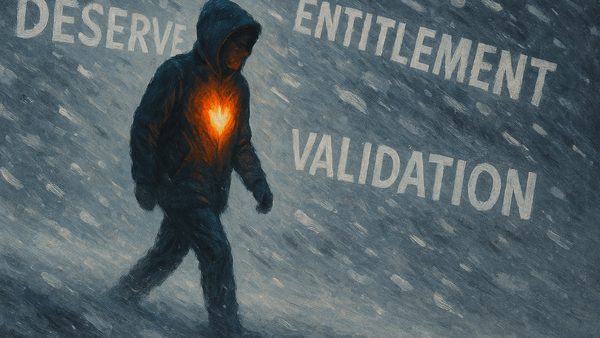The Prohibition of Comparing
If someone tells you a specific comparison is not appropriate or allowed, red alert should start flashing in your mind.

Our whole world unfolds in comparison of extremes. All the colors between light and dark, all the emotions between peace and rage, all the moments of ‘Ahh’ between ignorance and insight. More or less consciously we compare anything and everything. Our whole mental construct is based on a gigantic network of relational connections between the multitude of sensory experiences of different objects we constantly compare with each other as more information and new objects are added. Anything we experience with our mind is relational.
The whole world of science also operates under this essential principle. Different results of different experiments or iterations of the same experiment as well as input and output are compared with each other to draw conclusions. Any new observation is compared with previous observations. Any result is set in relation to other results. The objective is clear: insight.
Comparing has one single purpose. To identify the differences and similarities between a subject and one or multiple objects. It is a tool that delivers the prerequisite for our ability to choose. Comparing is a fundamental behavior of any living being. Anything that lives strives for the survival of itself, its offspring, or its species. We all choose what appears most suitable for survival. Constantly. And to be able to choose we must compare. Consequently, if you don’t compare you’re not able to choose. Someone else will choose for you.
The Denunciation of Comparison
It is a common strategy to manipulate this instinct by denouncing it with the notion that certain objects can not, should not, or must not be compared, to maintain a low level of transparency.
“You can’t compare that.”
“We must not compare that.”
In certain instances, comparing is not just socially sanctioned but legally criminalized. The truth is that this is unnatural, unscientific, and manipulative. It is always just to make a comparison, presuming it is not used as a tool of manipulation itself (see below). This holds true even if the subject and object appear to be very different because only by proper comparison this alleged difference can be validated—or invalidated when similarities are discovered.
Example: comparing racial attributes in humans is considered inappropriate by certain people. Typically the reason is the implementation of some personal or political agenda. A desired result (e.g. “all humans are equal”, “there are no differences”) is predefined, and comparing would bring about the full spectrum of findings, including the differences (or similarities) that were to be concealed. This would evoke the need to discuss the collective findings in a proper debate. But a proper debate would also limit the options to enforce agendas of particular interests. Comparison creates transparency. Identifying and valuing all the racial differences and similarities in humans would enable us to address individual needs and talents much more effectively. For example, if the average IQ of a certain racial group were lower than the IQ of another group, their ability to contribute to society as well as their need for support could be administered adequately.
Another strategy is to replace the term “comparison” with another term that has a different meaning and is more suitable to create an emotional or moral connotation. A common argument here is that a certain comparison would exercise or imply some form of equalization of subject and object and would therefore relativize attributes of the object in a way that trivializes the effects of that object, which are commonly perceived as morally inadequate. The allegation here is that the act of comparing would imply or constitute approval of the effects of the compared object, which are commonly or politically perceived as morally inadequate.
Within this replacement strategy, the aforementioned terms—which all have very different meanings—are used to transition from the original meaning of comparison over equalization and relativization to trivialization.
- Comparison means the consideration or estimation of the similarities or dissimilarities between a subject and one or multiple objects.
- Equalization means the action or process of making things the same in degree throughout a group.
- Relativization means the act of making or treating an object as relative to or dependent on a subject.
- Trivialization means the act of making an object seem less important, significant, or complex than it really is.
The mere identification of similarities (comparison) has nothing to do with the act of devaluating the significance of an object (trivialization), even though we often see such accusations as a form of manipulation through language in mainstream media as a typical tool of propaganda. While a mere comparison is neutral, because it simply outputs a set of similarities or differences, a trivialization can easily contain an element of degradation and is, therefore, suitable to create strong emotional oppositions within a population.
Example: It is not perceived as acceptable to compare contemporary forms of socialism or socialist or leftist movements to the former German movement of National Socialism. Therefore, a common reaction to any such comparison is to call it out as an attempt to equalize the two and set them into a relation that intends to trivialize the devastation caused by National Socialism. This is particularly interesting because it is precisely the application of the tool of comparing that would be necessary to identify the differences between the two movements to draw the line and formulate a clear distinction. As stated before, comparisons make things transparent. It inevitably exposes the similarities. Additionally, it exposes the differences in which the negatively connoted object (e.g. National Socialism) outperforms the positively connoted subject (e.g. modern social democratic or leftist ideology) in objective measurement variables. More often than not full transparency is not desired. Thus, anyone is well advised to be careful with publicly stating the findings of their comparison if they touch on a polarizing political topic.
It is important to note that the tool of comparison can also be used as an ally for manipulation; by comparing subject and object and deliberately hiding or eliding certain similarities or differences to create a bias.
Example: One visits a car dealer to purchase a new vehicle. After seeing all the cars available for sale, two of them remain as possible candidates—a cheaper one and a more expensive one. The customer asks about the differences between the vehicles and the vendor lists a few minor things like the ambiance lighting and the type of sound system installed. He omits that the cheaper car had a severe accident that required the fixing of parts of its chassis. The customer happily purchases the cheaper car with the assumption he made a good deal.
If any person or group of people tries to keep you from comparing certain things, their objective is most likely to distract you from discovering their differences or similarities. Especially with regard to politically charged topics, if someone tells you not to compare, you should be particularly cautious; because it is likely that there is a high degree of similarity that is to be obscured from your eyes.
Anyone trustworthy will always point you to alternatives and options, point you to the similarities and differences to their best knowledge to support you in making a sound decision. Those people are friends.
Comparing the Right Things
If you compare your own life to the portrayal of someone else’s life you see on social media, for instance, such a comparison is indeed valid, but it can’t be effective. Sure, you’ll identify the differences; but differences between the wholeness of your entire life, the specific way you experience it, and the curated projection of the other life—not their actual life but a tiny fraction of it which is often not even accurate. This is a degenerated form of proper comparing, which was originally supposed to secure our survival. It is a form of misled instinctive behavior.
The bigger the identified differences between one’s life and the curated and censored version of another life, the better the individual can be emotionally controlled or sold remedies to fix the perceived gap. No matter if these products come in the form of consumption goods or government programs, they will never address the issue: ineffective comparison.
If you compare a specific aspect of your life—like your fitness level—to that specific aspect of someone else’s life and you limit the comparison to that aspect, your comparison is effective and enables you to draw conclusions and take action.
Make sure you know which category your subject and object you want to compare belong to before you start with your comparison to avoid exploitation. You can compare varieties of apples. You can compare varieties of fruit. You can compare varieties of plants. But always know what it is that you compare. If you compare some plant with some variety of apple, know what you’re doing.
Comparison is both a powerful sword and shield. Learn to wield it properly and use it for the good of others, not to manipulate them. Once you take it into your arsenal of liberation tools and start using it consciously, you’ll be flabbergasted in which places you discover similarities.
Did you enjoy this article? Please consider contributing to this publication’s financial freedom.
Flows straight into content, not coffee.




